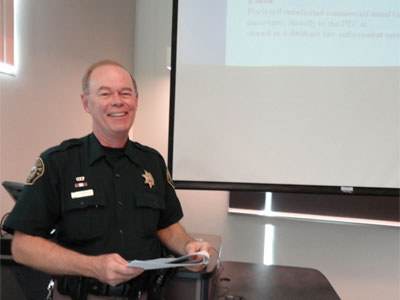Hill Hall welcomed in Deputy Gordon Neunfeldt Thursday morning to discuss the issue of identity theft. By describing the many ways that thieves can steal your identity, Neunfeldt hopes to help prevent identity theft from happening to you. “Identity theft is an ugly issue,” he explained, “…it is pervasive and it is not stopping.” Neufeldt added that the first step to avoiding identity theft is to become aware of the threat.
11.1 million people nationwide become victims of identity theft each year and spend up to 5,840 hours repairing the damages. Among the worst offenses include flagging, skimming, dumpster diving, and phishing/e-mail scams.
Flagging occurs when mail is sent through the mailbox, leaving the “flag” up. This is a clear sign for criminals that you have something in your mailbox that may be of value to them, such as personal information or checks. As alternative, Neunfeldt recommends taking all outgoing mail to the post office for it to be delivered.
Skimming occurs when a criminal captures information through an electronic device, especially an ATM. In this case, criminals will put a “trap” in the ATM which will eat your card. Then they will offer to help you and watch as you type your pin number over and over. As you walk away in frustration, the thief can then retrieve your card and withdraw money from your account. If you cannot retrieve your card from an ATM, make sure to stay by the ATM and call your bank immediately.
Although dumpster diving is not as common today, it still happens. Make sure any document with personal information that needs to be thrown away or recycled is shredded first. Be especially aware when getting a prescription filled, and dispose of the health documentations yourself, for pharmacies will not shred them, thus making it easy for thieves to find a plethora of information right outside in the dumpster.
Phishing and e-mail scams are easy ways for criminals to take advantage of you and receive personal information. Neunfeldt, a victim himself, is especially motivated to prevent this type of fraud. The best option is to never give out personal information over the phone or internet unless you have initiated the discussion. Also avoid giving away your social security number, even for an online job application. If it is unavoidable, be sure to print out a security statement given by the company. And be alert to scams, especially those located on the jobs section of craigslist.
If identity theft does happen to you, it is important to first contact both your bank and credit card companies to ensure that they are aware of the issue, and then file a report with the police department. An additional report will need to be filed with the Federal Trade Commission, and finally contact major credit reporting agencies to ask for a freeze on your account to protect your credit score.
It is important for college students to be aware of identity theft, because, as Neufeldt described, “Ages 20-29 are most susceptible.” Identity theft is “constantly evolving and changing.” We must be aware of the issue and take the small steps to prevent identity theft from happening.
Extra Steps to Prevent Identity Theft:
1. Do not carry your social security card, insurance cards, or your ATM pin number with you.
2. Write “ask for ID” on the back of your credit card.
3. Watch bank statements closely and report any unusual activity in your account.
4. When writing a check, do not use a ball-point pen, use a gel pen or marker, for these inks cannot be “washed” off.



'Protect yourself from identity theft' has no comments
Be the first to comment this post!